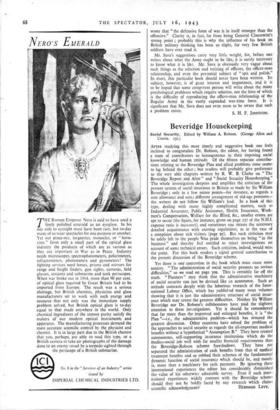Beveridge Housekeeping
Social Security. Edited by William A. Robson. (George Allen and Unwin. ass.) AFTER studying this most timely and suggestive book one feels inclined to congratulate Dr. Robson, the editor, for having found a team of contributors so homogeneous in their imposing social knowledge and human attitude. Of the fifteen separate contribu- tions relating to the Beveridge Plan and allied problems none seems to lag behind the other ; but readers will probably give preference to the very able chapters written by R. W. B. Clarke on " The Beveridge Report and After " and " Social Security Housekeeping." The whole investigation deepens and amplifies the criticism of the present system of social insurance in Britain as made by Sir William Beveridge ; only in a few minor points—for instance, as regards a rent allowance and some different arrangement of old-age pensions— the writers do not follow Sir William's lead. In a book of this type, dealing with many highly complicated matters, such as Industrial Assurance, Public Assistance, Health Insurance, Work- men's Compensation, Welfare for the Blind, &c., smaller errors are apt to occur (the figure, for instance, given on page 237 of the N.H.I. expense ratio is incoirect), and sometimes one misses the necessary detailed acquaintance with existing regulations, as in the case of a complaint about sick visitors (page 95). But such criticism may be safely left to the people iho pride themselves on being "in the business " and thereby feel entitled to reject investigations on account of some technical errors. Such criticism, indeed, would miss the point. For this book renders a signal general contribution to the present discussion of the Beveridge scheme.
Yet there is one contention in the book which must cause some anxiety. "The administration of social security presents no serious difficulties," so we read on page 309. This is certainly far off the truth. " Planners " may think that the administrative machinery of social security can just be devised like an automaton. Such an attitude contrasts deeply with the laborious research of the Inter- national Labour Office, which has published many stout volumes showing that it is just the administrative structure of social insur- ance which may create the greatest difficulties. Neither Sir William Beveridge nor Dr. Robson's collaborators have paid the slightest 'attention to these investigations. Yet it should be remembered that far more than the improved and enlarged benefits, it is " the Plan "—i.e., the administrative problem—which has aroused the greatest dissension. Other countries have solved the problem of the approaches to social security as regards the all-important medical benefits without a hypothetical " Assumption B." They have created autonomous, self-supporting insurance institutions which do the fnedico-social job well with far smaller financial requirements than the Beveridge-Robson scheme foreshadows. They have not separated the administration of cash benefits from that of medical treatment benefits and so robbed their schemes of the fundamental dynamic function of social insurance which should be, and mostly is, more than a machinery for cash payment. By ignoring these international experiences the editor has considerably diminished the value of his otherwise admirable survey. Even if such inter- national experiences widely contrast with the Beveridge scheme should they not be boldly faced by any research which claims


























 Previous page
Previous page